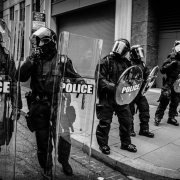From a Soft Whisper to a Giant Roar: London Youth have been Speaking.
Less than a week before the London riots, teenager Chavez Campbell predicted the riots stating, there will be riots. There will be riots. Before that, Jody McIntyre’s Bars for Change, a short video that featured numerous grime artists challenging the power of the police aired on channel four. Durrty Goodz in the first episode made the statement in regards to previous police killings such as Smiley Culture, until we see justice, there will be no peace.
Less than a month before the riots, an event in Brixton which asked the question Who polices the police? ended with dozens of people, most of them young, filing complaints against the police for misconduct.
Live Magazine ran an article in its summer issue discussing the racial profiling and its use by police in stop and search procedures. For those who were listening to these subtle yet presents cries, the riots should not come as much of a surprise.
The recent riots in London have gained worldwide attention and brought to light some of London’s economic and racial issues. Many have voiced concerns over the effects of the riots. However, much like the Brixton Uprising and the previous Tottenham Riots, economics are a major factor. There is a correlation between the riots and recent cuts that affected numerous youth centers and the rise in tuition fees.
It seems that rather than the government addressing the issues at hand, they are far more dedicated to punishing the rioters. David Cameroon highlighted this by stating  “If you are old enough to commit these crimes, you are old enough to face the punishmentâ€.
Severe punishment and increased police presence will increase tension between youth and police, once more creating the circumstances that helped spark the riots. The government should instead be looking at its very active role in the riots.
There seems to be a gap in the government between what they do and how the people react. Student protests throughout the year have demonstrated that the people, specifically young people are unhappy with its government. The assumptions that young people have not been speaking are untrue. There were numerous signs that London youth want a voice in their city. That is essentially what caused the riots.
Why does the UK government insist on ignoring its past? Smiley Culture, 1981 Brixton police profiling, lack of positive economic venues for youth, these are ghosts from the past living in the present. As proven in theLondon riots, they cannot to creep into the future.
United States gang expert William Bratton was hired to address the causes of the riots and increased gang activity. This money and energy should instead be used to invest into the youth, education and jobs. Why not talk to people like Chavez Campbell, real young Londoners who clearly seem to have a better grasp of the situation.
In addition to listening to the youth and funding youth centers, there needs to be a greater investment in youth oriented programs that encourage physical activity and positive mentorship. Living The Dream is a youth run dance company, which gained recognition for several things, one being a flashdance performed at Kings Crosson New Years eve. YBS is another organization that works with young people hosting events, success oriented sessions. They also have mentorship programs for younger people.
These are just some of the few examples of organizations that are investing in young Londoners. The riots in London proved the urgency in doing so.
Written by Caroline Karanja




